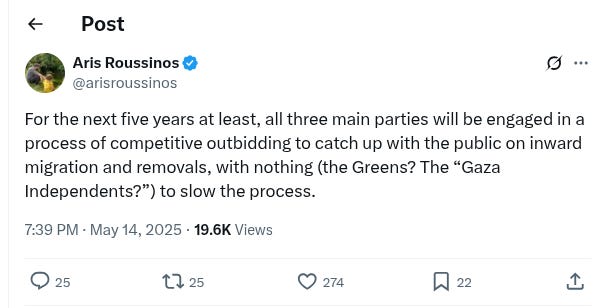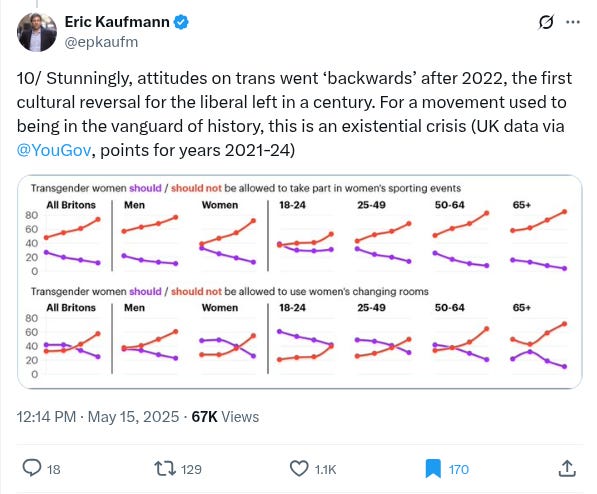You Are Never, Ever, Ever Getting That Apology
What happens when the "right side of history" starts losing its cultural battles?
On a recent episode the Podcast Blocked and Reported, English commentator Helen Lewis reflected on how ultimately unsatisfying the recent UK supreme court ruling on access to woman-only spaces was from a TERF perspective. The nature of the ruling implied an official admission that the gender-critical position had been, if not right, then at least reasonable and legally defensible all along, but beyond the ruling no actual admission to that fact was forthcoming from the political system.
For many years mainstream politicians who had been happy - eager in fact - to argue that positions held by a majority of voters were fringe, deranged and cruel; and to use or allow the system to be used to interfere with and sometimes attempt to ruin the lives of anyone who disagreed. Upon the ruling it seemed they had switched sides but without ever passing through the necessary phase of acknowledging or accounting for previous errors.
This issue is not an outlier. The re-election of Donald Trump seems to have coincided with an era of widespread reversals of socially progressive policies, in a way that would have felt impossible a few years ago. Many of these reversals are fake or temporary; but the idea that we can even visualise the unmaking of progressive cultural victories would have seemed shocking a few years ago. Everywhere you look there is the sense of a tide turning; the question arises as to how those parts of the system used to habitually viewing themselves as being The Right side of History will deal with this defeat. Can the progressive wing of liberalism admit when it was wrong? And if it can't, does it matter?
To understand the extent of the challenge, it’s worth pausing to consider the breadth of the rollbacks of progressive victories.
On Trans issues, this article summarises the global situation; not just based on the UK supreme court ruling mentioned above, but constitutional amendments in Hungary, and bans in the US related to trans participation in women's sports. All of this has been accompanied by a noticeable change in public attitudes as captured by polling, see below.
Immigration and asylum are the other key cultural issues where the temperature has suddenly changed; as well as the recent tonal shift from the Labour Party in the UK as they face off the challenge of the Reform, this report highlights how even “in the European Union (EU) (in 2024), one election after another has demonstrated the centrality of irregular migration and border security in public discussions and forced mainstream parties to take more restrictive approaches to calm fear and anxiety… The results of the European Parliament election, France’s snap election, three German state elections, and the Austrian election all showed a strong rightward drift and signaled voters’ distrust in their national governments, confirming the notable shift in tone on migration in Europe toward a more securitized, hardline approach, even among mainstream parties.”
The lingering impact of Covid policy is the great forgotten issue of our time and there too, many of the decisions deemed sacred by liberal western governments have been quietly overturned or reoriented since the end of the pandemic. Learning loss, the lab leak “theory”, vaccine injuries, and business arrangements on how the vaccines were purchased - all manner of things were undiscussable until suddenly they weren’t, and now they are out in the open and festering away.
In each case, the political battlefield is littered with the mangled lives and reputations of people who sought to dissent from the most progressive positions, or the positions held by the most progressive people - often in a minimal and deferential way - and were crushed with extravagant cruelty masquerading as empathy for their troubles.
The era of progressive overreach reached its high watermark during Covid-Floyd era; as with all binges, there’s a vicious hangover and a price to be paid for all that self-indulgence. The western political system is now going through what Aris Roussinos recently called “competitive outbidding to catch up with the public” on social and cultural change. It’s clear that the mainstream can’t stick to its old positions anymore, but to what extent should it admit *error*? Can it even do that?

Such admissions are certainly expected of others. It has long been normal for conservative, right-wing or non-liberal figures to back away from positions held by their historic counterparts that are no longer considered fashionable or acceptable. This has changed somewhat as part of the era of liberal reversals, and in part due to the way that performatively nasty online rhetoric has penetrated the mainstream. But up until very recently a mainstream conservative figure with national electoral ambitions in a western country would have been expected to begin any discussion of the difficulties of demographic change (for instance) with catechism-like rejections of racism and nazism or by boasting of their dedication to the overall goal of multiculturalism. Rebuking the decisions their own party or historical equivalents made in the past was the price to be accepted as a legitimate participant in the system. It was also the natural entitlement the progressive wing could expect for being the Right Side of History.
As a result, whatever their other flaws, a person with an illiberal position is always capable of visualising themselves as the bad guy; this after all this is the face they see everytime they look in the mirror of the media. Perhaps that’s healthy. But on cultural issues, Progressive Liberalism has had things its own way for so long that it has lost the capacity to consider what it might be like to be wrong - not misguided, not mistaken but wrong from 1st principles - a capacity that every other ideological stream is required to have and to display. This is part of the wider problem liberalism has of being unable to conceive of its opponents as legitimate.
It's difficult to think of an example where a liberal system got a cultural question flatly wrong, and subsequently changed course, and was required on an ongoing basis to admit the error as the price of being seen as legitimate participants in politics. Eugenics, which had widespread support from the liberal cognoscenti in the early part of the 20th century, is one candidate. But that’s an exception that proves the rule. As a progressive idea also closely associated with illiberal regimes, rebuking it is cost-free and comfortable. If eugenics had been enacted by the left only and never subsequently associated with the right, with fascism and Nazisim, it would be utterly forgotten to the general public, memory-holed in the same way that left-wing association with paedophelia has been.
This point here is that it helps illustrate how part of the narrative privilege of progressivism has in our culture is that its failures and flaws are always memory-holed, and its successes become our culture’s new benchmarks, the ones that even its opponent’s must bow to. A worldview that takes that pattern as natural doesn’t adjust well to widespread failure or rejection.
That brings us to the question of whether it matters if the system, or its most progressive voices, ever admit that they were wrong. The rollbacks are happening in any case. For the people who pushed back against the most liberal positions on immigration, gender issues and so on - can’t they simply take the W?
Let’s think about this. Imagine you’ve been imprisoned for a crime you didn’t commit. Not just imprisoned but punished - you’ve been pelted in the stocks, been branded with hot irons and flung in the hole. You campaigned for years protesting your innocence and were punished all the more for that. One day the door of your cell swings open and you’re free to leave and carry on your life as it was before - but the system gives you no indication it’s actually changed its mind, no admission of error. Isn’t that enough?
It isn’t, because you need that admission to reconstruct your psychological life and social standing. You lost friends, time, employment opportunities, social position. Even someone who received no direct punishment was expected to quietly suffer under continual and oppressive psychic weight of living and celebrating an obvious lie as though it was the truth, every day. An admission that the system was wrong gives you a formal basis to recover those things, a sense of security that it won’t happen again, and lends retrospective value to being dragged through the mud. Without that, it’s a double injury in a way - the system gets the benefit of learning its lesson, but not with the price of having to admit that it failed.
For a loser in any conflict, part of the function of an admission of defeat is to convince the winner to settle for less. But the failure to extract such an admission instead prompts the winning side to set revenge and punishment as the goal rather than mere victory. “Looks like they haven’t had enough - let’s see if we can’t make these people feel the discomfort we felt - the cognitive dissonance of having the whole world tell you you're wrong for years on end, while you are forced to sit in that moment like a scolded schoolboy. Why should they get to walk away?” It certainly explains why the start of Trump’s second term felt more like the execution of a plan of personal vengeance than a conventional political administration.
Of course it’s important not to over-emphasise the extent of progressive cultural defeat. Their ownership of culture-making institutions may have warped and weakened those institutions; and may have reached and passed the peak of its political usefulness - but it hasn’t ended, and those institutions aren’t powerless. Having never experienced a reversal like this before, they will likely simply refuse to formally admit either to the world or themselves that they’ve lost. That denial will be buttressed by the ownership of those mythmaking institutions which will continue their role. On the narrative side it will likely be as though nothing has changed; I don’t think it’s unrealistic to believe that when the record is written in 50 years time that TERFs and the immigration restrictionists and so on will still be the villains, even if their preferred policies have been enacted.
In its current position the Progressive arm of the system is like a very privileged, entitled, self-absorbed person who has been caught in a lie or a mistake and who has no choice but to walk it back. The best kind of powerful person wears their power lightly and with an air of self-deprecation but that’s not who we’re dealing with here. This high-status blowhard has changed because they got caught and for no other reason. They would make the same “mistake” - that is exert the same privilege with maximal cruelty towards all who disagree - again in an instant, joyfully, with extra venom to pay you back for having noticed their error, if they thought they could get away with it. Not only that but they will look for opportunities to do so. That being the case, if you are their foe and have them on their heels, why show anything but malice? Why do anything but move in for the kill?



It's been said that you can achieve a great deal if you're unbothered about taking credit for it. Perhaps it's also true that you can inflict severe losses on your opponents provided you don't force them to publicly admit it.
Anybody with an unconstrained, Whiggish view of politics that sees their objectives as inevitable is especially unlikely to admit fault. By comparison, the constrained view of politics is all about deciding which losses you'd prefer to take.
What an outstanding essay, Conor.